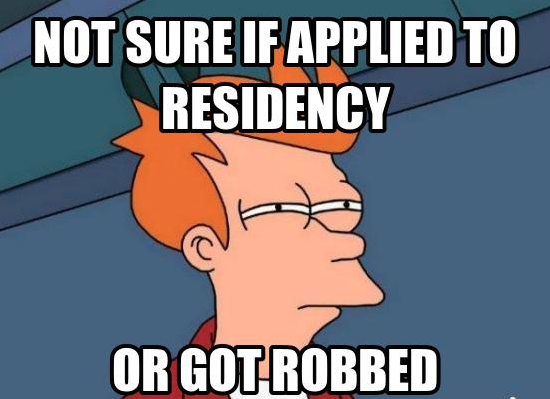Got a burning question that you want answered? Leave a comment and I’ll be sure to get back to you as soon as possible!
When will we start taking mental health seriously?
As a fourth-year medical student in a sub-internship in internal medicine, I have something that no doctor in America has. I have as much time as I want to spend with my patients. Don’t get me wrong, I am still a student. I’m still paying hospitals to let me be there, and I only have a maximum of four patients per day, but I inevitably end up spending more time with each patient than the average resident.
Today, I spent my time with one patient in particular. She was a Caucasian woman who was a previous intravenous drug abuser who has been sober for fifteen years. She is on methadone and takes Xanax for anxiety. She presented to the emergency department for a week of worsening malaise and generally feeling unwell. She also suffers from chronic respiratory failure secondary to chronic obstructive lung disease (COPD) due to her extensive cigarette smoking history.
We worked her up and ruled out pneumonia, a COPD exacerbation, urinary tract infection, an underlying malignancy, infection, or anemia. She was stable and not acutely ill, so we readied her to be discharged from the hospital. When we told her the good news, she broke down, cried, and begged us to help her. Not exactly what we were expecting.
She told us that she didn’t want to take the Xanax anymore. That she was becoming increasingly dependent on them. She understood that she was physically healthy but flat out told us that she was mentally ill. I remember she said, “It feels like something clicked in my head, and I don’t know what to do to get better. I just want help.” The problem was that she was physically healthy, wasn’t a good candidate to be transferred to the psych floor, and that she could simply follow up as an outpatient. She understood but was distraught.
“Please help me,” she insisted. I can see how more experienced doctors hate these types of patients. Previous drug abusers who end up in poor health and are looked upon as a succubus who drains the healthcare system of its resources. Occasionally however you find someone who just wants to get better. I believe, maybe naively so, that this was an example of the later.
At what point will sickness of the mind be treated equally as sickness of the body in our society and culture? There is a terrible mental health epidemic currently occurring in the United States, but the only thing I know about the problem is that we need to fix it. I believe that the first step that we as physicians, friends, brothers, daughters, and loved ones can do is to perceive and prioritize illnesses of the body equally to sickness of the mind. Maybe then we can start to take care of the patients who truly want to get better.
The original post was published on KevinMD.
An Inside Look At Medical School in Dominica
This interview, originally published at Accepted.com, delves into what going to a Caribbean medical school is really like.
Accepted: First, can you tell us a little about yourself?
Marc: I grew up in East Brunswick, New Jersey and I went to Binghamton University for undergrad where I studied biology. I’m currently a fourth year medical school at Ross University School of Medicine. I’m finishing up my clinical clerkships in Brooklyn, New York and I’m in the process of applying for a residency in internal medicine. In my downtime I like to play basketball and soccer and the last book I read, Ready Player One, is the focus of Steven Spielberg’s next film.
Accepted: Looking back, what was the most challenging aspect of the med school admissions process? How did you approach that challenge and overcome it?
Marc: Unfortunately I didn’t realize that I wanted to go to medical school until the end of my sophomore year at Binghamton University. I got my act together by the time I had to apply to medical school but the damage to my GPA was already done. I applied to 28 schools and Ross University was the only one that gave me the opportunity to become a doctor. However, looking back at it, I wouldn’t have accepted me to a US medical school either. But I knew what I wanted to do and didn’t want to wait to start my career. So without taking any time off after graduating I took the opportunity I was given at Ross and started medical school in the fall on the tropical island of Dominica.
As for the application process itself the secondary applications were the worst part. I didn’t expect to get a secondary application from almost every medical school that I applied to. That was another application fee, another essay for each school, and another application form to fill out. It was exhausting. If I could do it all over again, I wouldn’t have applied to so many schools.
Accepted: What is your favorite part of attending Ross University?
Marc: I loved my time on the island. At Ross we spend our first two years of medical school on the island learning the foundations of medicine. After that we come to the US to complete our clinical clerkships.
My favorite experiences were the afternoons we spent at the beach after our exams. You also have a few opportunities every once in a while to go on some exciting day trips. I went on a seven hour hike to the Boiling Lake which is the second largest hot lake in the world. I climbed through a forest, like literally army crawled underneath fallen trees, and through almost knee deep mud to the top of Morne Diablotins, the tallest mountain on the island. There also always seemed to be a mild mist in the air that let me see the most number of rainbows I’ve ever seen in my life. And the sunset runs on the beach. It was a great experience.
You also make some really close friends during medical school. I wouldn’t have made it to my fourth year without my island friends who became my island family.
Accepted: Can you tell us about your clinical experience?
Marc: Ross offers track programs all over the country. A track program lets you stay at one hospital for the entirety of your third year instead of moving around for every rotation. I was accepted at a Brooklyn track program and I’ve had a great experience. Every day I feel slightly less useless and there is always something more to learn. It’s part of what excites me about starting my internal medicine residency. At the end of the day, no two medical students have the same experience during their clinical clerkships and it truly is what you make of it.
Accepted: Can you share some advice to incoming first year students, to help make their adjustment to med school easier?
Marc: If you’ve been accepted to med school it means that you possess the intelligence and work ethic necessary to succeed in med school. I’ve written a blog post, How To Study In Med School, which goes into what I tell every incoming medical student. That you basically have to figure out what works for you and make consciences decisions to enhance your study process. But before medical school starts go enjoy yourself.
Go get a beer with your friends, go to that concert, go on a road trip, and finish your summer bucket list because you will never have as much free time in your life as you do right now. It only gets harder. Med school is tough and residency is rougher. Enjoy your time before starting medical school while you still can. Med school isn’t going anywhere but your free time is about to evaporate into thin air.
Accepted: Can you tell us about your blog? When did you start blogging? What have you gained from the experience? Can you direct us to 3 of your favorite blog posts?
Marc: I wrote my first blog post the night before I left for Dominica. It was originally published at KevinMD.com. I started my own blog after my first semester when writing became a cathartic process for me. Writing let me process what I learned in med school and reflect on the experiences I’ve had. Then I started writing pieces of advice – things I wish I knew when I was in someone else’s shoes. It’s become of the primary driving forces for my writing. There is a lot of unknown in medical school and it can be terrifying, frustrating, and infuriating. I wanted to be able to provide a positive perspective for students who are going through what I went through.
My first blog post, Pre-meds: Do what it takes to get into medical school, is a favorite of mine because it shows me how my writing has evolved and matured. I’ve also gotten some great feedback from my post The Medical Student’s Guide to Clinical Rotations, which is a post about what I wish I knew before I started my third year. I’ve also gotten some great feedback on How To Study In Med School from Ross students and US and foreign medical students alike. It’s been fun to hear from medical students, residents, and attending physicians from around the world and learn that the medical school experience is similarly daunting no matter what school you are enrolled in.
Accepted: Do you have any other advice for pre-med applicant readers?
Marc: I know the MCAT structure has changed and that pre-med requirements are always fluctuating but I would highly advise any pre-med student to take molecular genetics, biochemistry, and a human anatomy and physiology course even if you aren’t required to do so. I took biochemistry in undergrad but it truly paid its dividends. It makes those pesky biochem lectures during the first two years of med school that much easier.
I would also advise pre-med students in undergrad to become a teaching assistant or a tutor to really cement your knowledge. You don’t truly know how well, or conversely how poorly, you understand a concept until the moment you try to teach it. See one, do one, teach one.
I would also tell pre-med students to learn for long-term retention instead of going through the cram, memorize, regurgitate, purge cycle. You might be more mature than I was in undergrad but I only realized the importance of truly understanding a subject instead of just memorizing it quite late in my undergrad experience. It took me a while to realize that when you understand something you don’t have to memorize it. Sure, some facts you just need to memorize but for the most part you should try to understand it. At the end of the day, whether it is on the MCAT or in medical school, you are going to see this information again— so rather learn it properly the first time around.
And lastly, you can do this! I am always happy to answer questions at my blog MyKittyKatz.com or via Twitter @MarcKittyKatz. Good luck!
Away Rotations
A third year medical student asked me, “should I have all my away rotations done before ERAS opens or nah? I’m concerned with whether I did aways before Sept 15th [when ERAS opens] or if they went into late Sept or October too. Is prior to Sept better?”.
Short answer: Depends if you want a letter of recommendation or not. If you do, then ideally you should be done with your elective before ERAS opens. If you are not looking for a letter then you should still rotate through any away hospital before hospitals are required to submit their rank list in January. I highly suggest reading, or at least skimming through, “The Successful Match: 200 Rules to Succeed in the Residency Match“. It talks about all of this in much greater detail.
Long answer: Away rotations are perfect ‘extended interviews’. They let programs see who you really are and, anecdotally, can help or conversely hurt your chances at matching at a specific program. In my mind, if you are a third year who is already planning out your fourth year electives then you likely have a good head on your shoulders. When you go to your away rotation just work hard and take care of your patients. Everything else will fall into place.
There are a few caveats pertaining to when you should perform away rotations. First off, are you trying to secure a strong letter of recommendation? If so, then you likely want to start an away rotation in July or August to ensure you get your letters in on time. You can still get letters from rotations during September and October but these should not be your first letters. Programs can filter you out if your application is not complete so you ideally want to have your letters in by September to ensure you have all of the appropriate documents ready to go.
Okay so I submitted my residency application- what now? Away rotations are even more valuable than ever. Hopefully you’re rotating somewhere that you applied because you basically just got a month long interview (congrats!). Away rotations are a golden opportunity to show a program who you are and also a great way to see if you like the hospital. Is this somewhere you can see yourself working for the next three years? Anecdotally, a lot of students get interviews at places they rotate through and even match there too. Be careful though because as much as an away rotation can help it can also hurt you.
This should go without saying, but I’m going to say it anyway: don’t forget to work hard and take care of your patients! If nothing else, my very expensive medical education has taught me that common sense isn’t so common. Showing up isn’t enough. Take care of your patients, show interest in what you’re doing, and freaking learn something! You’re still paying them to be there so you might as well get your money’s worth. Okay, done ranting. Hope that answers your question!
tl; dr: Rotate through hospitals early, ideally with the elective ending before September 15th if you want to secure letters of recommendation. Away rotations are also valuable ‘extended interviews’ that can strengthen or weaken a program’s interest in you, and visa-versa.
*Image taken from The Happy Hospitalist
How to Successfully Submit Your ERAS Application
This post is for any third year med students watching your fourth year friends or Twitter followers freak out while ERAS crashes and runs at a snail’s pace. Here are my tips to successfully submit your ERAS application.
Finalize and upload your application before ERAS opens
There are thousands of applicants sitting in front of their computers waiting to click submit the second that ERAS opens. When it finally does open, the system is going to operate quite slowly if it doesn’t crash altogether like last year (the 2015 match). The last thing you want to be doing is uploading your personal statement, photo, or assigning documents to programs when the system is running so slowly. So do yourself a favor and finalize your application the night before.
Submit your application sooner than later
My biggest stressor about submitting my application was not knowing how late I could submit my application. Most programs don’t even download your application the first week. Admittedly, my source of information is hearsay and info from the internet and there are bound to be programs that break this guideline. But the majority fall under the bell curve of not downloading your application before the end of the week. Again however, every program is different and some will wait a few days to download your application, some will wait a week, and some might wait longer. It’s frustrating and infuriating that there is no clear-cut answer for when you should submit your ERAS application but the general consensus is the sooner the better.
Here is the dilemma I went through: I only got my step 2 CK score back on Wednesday but applications were able to be sent out on Tuesday. I sent out my application the day ERAS opened on Tuesday and resent my USMLE transcript the following day but I’m fairly certain I could have waited one more day to include my score with my application. It is a different story entirely if you were only getting your score a month or so after your application goes out. At that point the program would need to re-download your application in order to receive your updated USMLE transcript. In my mind, you can apply as soon as you want and get extra documents into ERAS the rest of the week as long as you get your extra documents in before your application is initially downloaded. When that tipping point is I couldn’t tell you. Just get it all in as soon as possible.
At least one of your letter writers will bail on you
One of my letter writers didn’t have the letter uploaded till the day before my application went out (thankfully I already had three others and didn’t even end up using it!). A friend of mine had a letter writer’s secretary forget to upload her letter entirely. It’s a frustrating and anxiety provoking experience. Do your best to gently remind your writers to submit your letter. From your perspective, this is THE most important part of your relationship with your letter writer at the moment. For them, you are likely at the bottom of their priority list. Not to say you aren’t important, but come on…you’ve worked with attendings before. They’ve got shit to do. My best advise is to secure an extra letter or two from people who are willing to write you STRONG letters. That way, if one of them falls through you will have extra ones that you can use and submit. Hopefully your worst case scenario is that you have too many letters and you don’t end up using all of them.
Personal statements are the worst part of the application
It’s hard to humble-brag about yourself while telling a compelling story that illustrates why you will make a perfect candidate for residency. Yeah, try that thesis statement on for size. Start writing your PS early. I wrote three different drafts before it evolved into its final form and those three drafts included dozens of revisions. Not to mention I only had to write a single PS for my internal medicine residency application. Some friends of mine had to write ones for surgery/emergency AND their back up. So start writing those rough drafts and keep on the look out for my follow up blog post about how to write a strong personal statement for residency. It’s a daunting subject and deserves its own post entirely.
I know this doesn’t nearly encompass all of the anxiety inducing questions that med students have on the subject so feel free to comment and ask me a question the process of applying for residency!
How to Study for the Psych Clerkship Exam
Psych is generally regarded as the easiest of all the shelf exams. That doesn’t make studying for it any easier. Here’s how I approached it and what I would have done differently:
Overview: There is always overlap when it comes to clerkship exam content. On the psychiatry shelf you will be tested on neuro, pediatrics, OB/GYN, and some internal medicine along with psychiatry. It’s annoying but it makes sense if you think about it. For instance, if a patient comes in with increasing forgetfulness your differential list can be quite wide. This being your psych shelf you might be anchored to a diagnosis like pseudodementia secondary to depression but you also have to think about Alzheimer’s and hypothyroidism.
Psych Specific Tips: Know the timeline for psychiatric illnesses cold. You need to be able to differentiate brief psychotic disorder from schizophreniform from schizophrenia based on the timeline. And acute stress disorder from post-traumatic stress disorder. And both of those from adjustment disorder. It seems easy and it is. But the diagnostic criteria and various timelines can blend together quite easily when you are taking a two hour hour test and each question has the same differential diagnosis list. Also, psych meds are huge on this test so don’t neglect them.
Resources: First Aid for the Psychiatry Clerkship is gold. It has everything you need for both the clerkship exam and step two. My primary resource when I studied for step two was Master The Boards (MTB) by Conrad Fischer. It provides a good skeleton but leaves you dictating a lot of stuff that isn’t in the book. If you know everything in MTB then you will likely know all the high-yield stuff. But it is entirely comprehensive. That’s why I suggest the First Aid for Psych Clerkship. And as always, UWorld is the gold standard for practice questions.
Practice Questions: As I said, UWorld is the gold standard. Finishing the psych section is doable. I would also attack the neuro section while you’re at it. If you finish all of that then redo all the questions you got wrong. If you finish those questions and want more I would next use PreTest for pysch. PreTest presents a lot of good information that isn’t in any review books (FA, MTB included) or even in UWorld. Granted, some of these questions are beyond low-yield and you should always know the basics inside and out before you delve into the esoteric. That being said, PreTest is a good resource if you’re looking for a couple hundred more new practice questions before test day.
tl; dr: Use First Aid for the Psych Clerkship, annotate Master the Boards, finish the psych and neuro UWorld questions…and basically just know everything.
As always, this isn’t anything groundbreaking but I wish someone told me this when I started psych. Feel free to leave any follow-up questions you may have down below!
Test Taking Strategies: how to maximize your score
Your USMLE step 1 and step 2 scores are the most important pieces of information in your residency application. However, acing your board exams isn’t just about knowing the science but also about having strong test taking skills. At the end of the day, your score is a combination of how smart you are multiplied by how hard you work divided by your test taking skills. Here are my test taking strategies to maximize your score on test day.
Find your weaknesses
It’s hard to improve your test taking skills if you don’t know where to start. So do a question set of UWorld or two and while you are reviewing your answers figure out why you got the question wrong in the first place. In my mind, there are two broad categories of why you get questions wrong. The first is that you straight up didn’t know the answer because you didn’t know the science or medicine behind the question at hand. The second category of incorrect answers is due to poor test taking skills. So if you get a question wrong because you didn’t remember the auto-antibody that correlates with autoimmune hepatitis then don’t stress out about it. Just go study that subject material. However, did you fluster over this answer choice for five minutes? Did you eat up all of your time trying to remember the answer? That’s a test taking strategy and is something you have to work on.
So first, (1) figure out if you got the answer wrong because of a lack of knowledge versus poor test taking skills. Next, (2) continue to jot down the reasons why you got these questions wrong. Eventually, you might (3) find patterns in why you get questions wrong.
Recognize patterns concerning why you are getting questions wrong
So at this point you should have completed a few question sets and collected some data concerning why you are getting questions wrong. Maybe you are a great test taker and you just need to study the science a little more. If that’s you then stop reading this blog post and go study! If you’re like me, you might need to make a plan moving forward concerning how to improve your test taking skills. Some reasons why I got questions wrong in the past were because:
- I wasted time on ‘easy’ questions and had to rush through questions near the end
- I changed my answer choices
- I would be thinking about question number 1 while I was reading question number 2
- Test taking anxiety
- Stupid mistakes
Next, I will go into how I overcame these test taking weaknesses of mine and hopefully you can mimic what I did and overcome your deficiencies.
Overcome minor anxiety by simulating test day
A soccer coach I once knew used to hate when we took practice shots from a stand still. He felt that during a game you rarely had the opportunity to take a shot when the ball wasn’t already moving. It didn’t simulate the game realistically. Likewise, you need to prepare for the exam by answering practice questions against the clock. It will simulate the anxiety of test day and, hopefully, make you more comfortable when answering questions in the hot seat. This helped me get over my minor test taking anxiety. Those butterflies in my stomach.
Power poses are also a great subconscious confidence booster. Long story short, if you have positive, confident posture it will translate into a slight increase in real life confidence. That goes for test day too. Check out this TED talk that goes into more depth on the topic.
As an aside, this post is mainly for test taking strategies. Minor tweaks that can improve your score. Which means that if you have severe anxiety to the point where it is truly inhibiting your ability to take tests then please seek professional help. There is no shame in speaking to a psychiatrist about your test taking anxiety and they are much better equipped to help you flourish come test day. Same thing goes for people whose attention span could use a little artificial endurance.
Don’t overthink it and stop changing your answer choices
I recently tried this new ice-cream place in Brooklyn called Ample Hills Creamery (if you live in the area you NEED to go there). Looking at the menu I instantly saw the words ‘Salted Crack Caramel’ and knew what I wanted to try. Except then I saw other delicious looking options like ‘The Munchies’ and ‘Mexican Hot Chocolate’ and I started second-guessing myself even though I knew what I wanted to get. Likewise, when it comes to test day don’t overthink your answer choice. If you think you know the answer then click the bubble and move on to the next one. JUST CLICK THE BUBBLE AND MOVE ONE! Your first inclination is often your best guess…especially if you aren’t sure why you think it’s the correct answer choice (sometimes your gut is smarter than you and not just with regards to ice-cream).
UWorld also has a great tool to see where you are making your mistakes. I found that I had a greater number of answers that I changed from correct to incorrect that the other way round. By making a ‘click and move on’ rule I increased the number of questions I got right. It might only get you one or two questions right in each question set but they add up quickly. Especially when step 1 and step 2 are 7 and 8 question sets long respectively.
The only exception to this rule is if I went back to my question and found that I completely missed something. Oh, the patient had a myocardial infarction because he did cocaine! I’m gonna change my answer from beta-blocker to calcium channel blocker. Boom. Science bitch!
Once you eliminate the impossible, whatever remains, no matter how improbable, must be the truth
There were a lot of easy questions on step 2. Things that everyone gets right like ‘give IV fluids’ or ‘compare to old chest x-ray’. Then there are the cluster of questions that make me wonder if I forgot everything or if I just straight up never learned it. For example, on step 1 I remember a question on neurofibromatosis type I but I forgot that it is also often called von Recklinghausen Disease. At the time, I wasn’t sure if von Recklinghausen Disease was the same thing as neurofibromatosis type I or not. Instead of ruling IN the correct answer I simply ruled OUT the incorrect ones. With this approach I was left with only one possible answer choice and ended up picking the right one.
Ultimately, this isn’t anything new or groundbreaking that you haven’t heard before but its worth hearing again. When it comes to these standardized tests every question is worth an equal number of points. I hope that these test taking tips will help you get a few more questions right and help bump up your score because every little bit counts. Happy studying!
How To Pass The Comprehensive Shelf Exam
“I am a third semester student and I would like to ask you for some advice. I am deeply worried about the comprehensive shelf exam pass rate (~ 50%). I do not wish to have to retake it in the US. My goal is to focus on step 1 during that time. I have heard of a few people failing out of Ross because they did not pass COMP the 3 or 4 chances given. I plan on coming back a week early before school starts to start studying for COMP. In addition, is your study habits the same in which you applied for the step exam as well? They make the comp sound impossible…but it has to be possible.”
Short answer: the fact that you are already thinking about your study strategies for the comp exam and step 1 shows me that you will pass.
Long answer: Let’s get down to the dirty details now that I’ve delivered my mandatory inspirational quote for the day. First off, if you haven’t already check out my original post where I describe some general advice on how to pass your comprehensive shelf exam. That post is meant for fourth semester students who just took their final and now have one remaining month to study for the COMP. I know the curriculum has changed at Ross since I left the island and I’m not sure if they still give you one month for the COMP but the basic philosophy I describe should still be applicable.
I don’t know what the COMP passing rate is but even if I had those statistics I would be willing to bet that they would include quite a few confounding variables. Frankly, if you put in the time and effort you should be able to pass the COMP on your first try. The few people I know who failed the COMP failed because they didn’t put in enough effort. They treated the month before the COMP as a mini vacation more than a dedicated study period (see previous blog post above).
When I was on the island I also heard those alleged rumors of students failing the COMP on multiple attempts. They are just rumors. Even if they are true then those students are likely the outliers on the standard bell curve. They are the exception, not the rule. From here on out your mindset is not whether you pass or not. Your new mindset is how well you will do when you pass.
Now everyone is different and every student has his or her own study habits. Personally, when I left the island in between each semester I did zero studying. I may have organized and reprinted some notes but I certainly didn’t study. Let alone come back early to study. So for the sake of sanity do not go back early. That being said, everyone is different and you know yourself better than I do. So if you want to go back early to study then do it! I am simply concerned that you will burn out. Especially since during my fourth semester we had those dreaded eight hour days of lecture three days a week. I don’t know if that has changed or not but an entire semester of medical school is enough of a reason for me not to go back to the island early to study. So, again, if you are the type of person who alleviates their anxiety by studying then by all means go ahead but before you make any rash decisions check out my original post. Specifically the part about recharging your batteries.
Lastly, the study strategies that I employed for the COMP were identical to what I did for step one. A morning question set took me one hour to take and three hours to review. Then a one hour break followed by a four hour block of videos in the afternoon. That was followed up by an evening run on the beach, pick up game of basketball, or lifting session at the gym. Followed by a calm review session of everything I looked over that day after dinner. Then sleep, eat, study, repeat. Sleep, eat, study, repeat.
In the end, your step one score = (how smart you are) x (how hard you work). There is always someone out there who is smarter than you but there is no excuse for there being someone who works harder than you.
OB/GYN: What To Expect
“I’m starting my third year with OB/GYN. Do you have any tips or tricks for that particular rotation? Anything I should expect working with those attendings? Or anything the attending like or expect from us? Just anything that could help before starting.”
Short answer: Expect vaginas, babies, long hours, and lots of vaginas.
Long answer: During my obstetrics and gynecology rotation I rotated through each aspect of the specialty. Obstetrics, gynecology, gynecological oncology, a week with a preceptor, a week in the outpatient clinic, one week on days, and one week on nights. Days and nights are the worst because they are literally twelve hour shifts. My surgery rotation wasn’t even this bad. In surgery you can at least steal away to the library to study. In OB/GYN, you are constantly doing something. It’s a lot of work and in my opinion the toughest third year rotation. Not to mention all of the vaginas.
For me, one of the most difficult aspects of pediatrics and OB/GYN is the fact that it feels like I’m studying a complete different species. For the most part, in internal medicine, family medicine, emergency medicine, surgery, and psychiatry you study the medicine involved with the adult human being. Pediatrics and OB/GYN are completely different entities. The steep learning curve in OB/GYN is a tough one to tackle. So grab a review book and start reading and, like every rotation, be present! Learn as much hands on medicine as you can. The OB/GYN residents I worked with went above and beyond to teach. They get a bad rap in my hospital for being…high-strung. Yes, let’s say high-strung. All joking aside, they are hard-working, intelligent, and willing to teach but you have to be willing to work. Just don’t get stuck doing SCUT work all day. Yes you are there to help but first and foremost you are there to learn. So be a part of the team, be willing to help out, ask questions, and learn! Of course, pick and choose your time to ask questions. There is a delicate balance between inquisitive med student and OMG STFU med student.
OB/GYN also sends you into the surgical realm. So learn how to scrub in properly and be nice to the scrub nurses. Also be warned- there are certain scrub nurses who will be rude, curt, and straight up nasty to you in surgery. Don’t take it personally and just roll with the punches. Introduce yourself when you enter an operating room and state your purpose. My friend got into the habit of literally walking in and saying “Hi my name is John Smith. I’m a medical student” because when you walk into an OR everyone will look to see who you are and it’s kind of awkward if you just scoot in without saying anything.
As for the attendings, I stopped trying to guess what they are thinking and what will make them happy. Just show up on time, work hard, study your medicine, be professional, be kind to your patients, and you will be fine.
Let me know if you have any follow up questions. And as always, happy studying!
How Are 4th Year Electives Scheduled?
“I know the 3rd year rotations are set up back-to-back, but should we anticipate gaps between rotations during 4th year?”
Short answer: No. However, you are primarily responsible for scheduling fourth year electives so it is your job to make sure you don’t have any gaps.
Long answer: Ross tells you that they will call you based on your semester and help schedule fourth year electives with you. 10th semester students are called first, then 9th semester students, and so on and so forth. However, they have a limited number of hospital affiliations that they are able to schedule you for rotations at. This year’s hospital affiliations are California Hospital Medical Center (Los Angeles, CA), Center for Haitian Studies/Jackson Memorial Hospital (South Florida, FL), Cleveland Clinic Florida (South Florida, FL), Mount Sinai Hospital (Chicago, IL), Norwegian American Hospital (Chicago, IL), Saint Anthony Hospital (Chicago, IL), West Suburban Medical Center (Chicago, IL), St. Agnes Hospital (Baltimore, MD), Prince George Hospital Center (Cheverly, MD), and St. Joseph Mercy Oakland Hospital (Pontiac, MI).
Each hospital offers different electives and depending on which semester you are you may or may not get what or where you want. For instance, I was unaware that Ross only had three potential electives at Cleveland Clinic, FL which are breast surgery, vascular surgery, and an internal medicine sub-internship. I only have two more weeks in surgery left and I plan on it being my last two weeks of surgery so there was only one elective that I even wanted. Additionally, I only got the sub-I in February. It will literally be my last rotation of med school (woot woot!) but I was hoping to do a few rotations there instead of just one. If I knew this earlier I would have scheduled electives there on my own.
So don’t wait for Ross to schedule your fourth year electives. Most hospitals, including Cleveland Clinic, FL, have their own system of accepting students for rotations. So if you really want to rotate through a specific hospital then go to their website, find the paperwork, and send it in. I could have, and still probably can, schedule electives there. It just involves a little bit of extra paperwork. And I’m currently one month out from writing step 2 CK so changing fourth year electives is not my biggest priority. Though it’s a relief that I have my entire fourth year scheduled. 6 out of my 8 fourth year electives I scheduled myself…with the help of my friend who is way more on top of this type of stuff than I am (thanks Sonia!).
As for gaps- some hospitals start their electives on the first of the month and other start in the middle. For instance, although I applied to rotate through SUNY Upstate I didn’t end up scheduling an elective there because it would mess up my elective before and after the Upstate elective. The elective I wanted starts in the middle of the month. So I would have had two weeks off before the beginning of the elective. And then I would have had two weeks off after the Upstate elective ended. So it would have been a month of doing nothing. Which in retrospect is not that big of a deal. I will be finishing my fourth year at the end of February but I have until May to finish my rotations. I simply made finishing early a priority so I can enjoy myself before residency starts. In the end, small gaps like that aren’t a big deal. Just don’t forget to schedule electives so you don’t have months off or end up having to move half way across the country to keep from going into temporary withdrawal.
Hope my tangents weren’t too…tangential. Let me know if you have any follow up questions. Good luck!









